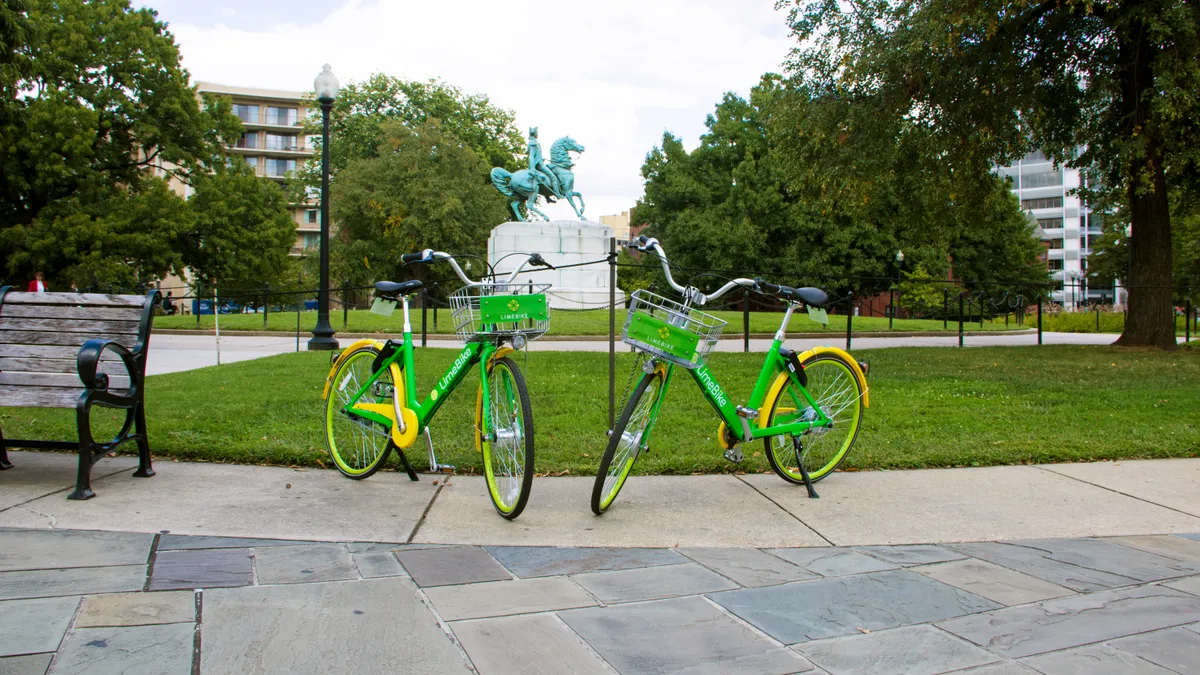When the dockless bike-share model erupted in the United States in 2017, critics said interest would quickly fizzle, as it had in China. Well, they might be right.
Less than two years after the brightly-colored dockless bikes suddenly began peppering the streets of U.S. cities, mobility companies just as quickly are pulling the devices and turning their focus to dockless scooters.
Perhaps the harbinger of what was to come with dockless bikes surfaced last year when Beijing-based ofo began exiting U.S. cities in which it operated, citing onerous municipal regulations such as a locking mechanism requirement for those participating in Chicago’s dockless bike-share pilot last year. That led ofo to openly criticize cities’ increasing governance of the industry, and within months, the company left all U.S. markets. Bejing-based Mobike has followed suit and is making China the lone country in which it provides dockless bike-share services.
Navigating regulations or bans and collaborating with cities all have been challenging for some dockless bike-share businesses. At first, many cities did not take kindly to the bikes appearing on their streets for a variety of reasons, with public balking about clutter from improperly parked bikes leading the charge. But leaders increasingly see dockless devices’ popularity and develop governance structures — often with input from amenable service providers who wish to create mutually favorable conditions.
Yet just as cities are really coming around to the idea, dockless bikes have been overtaken by e-scooters as the hottest single-user micro-mobility trend to pursue, and the bikes' presence is waning.
Going, going, gone
Lime has been pulling bikes out of many individual markets over the past few months, with a large push in March. This year alone it left dozens of markets including Reno, NV; St. Paul, MN; Green Bay, WI; Monrovia, CA; Mobile, AL; Wake Forest University and East Carolina University in North Carolina; St. Louis, MO; Rockford, IL; and several cities in the San Francisco Bay Area. Customers in Hartford, CT were told they could receive refunds for unused rides when Lime left that market.
Municipal representatives for these cities and others report similar stories: Micromobility companies say they're pulling dockless bikes, especially in small- to mid-sized markets, and are transitioning to scooter-centric business models. In some cities, the dockless bike exodus occurred just a few short months after a program was established. Some municipal representatives report they were told the dockless bike-sharing model has not been profitable but scooters hold more promise.
As a whole, mobility companies are relatively tight-lipped publicly about the greater movement and whether dockless bike-sharing has any future in America. One thing they will say is that they simply respond to current market demand.
“The demand for scooters exceeded, in many places, the demand for bikes,” Ariella Steinhorn, head of policy communications for Spin, told Smart Cities Dive. Spin eliminated the bike portion of its dockless business last year and went all-in on scooters. “The shift to scooters was to meet the demand and provide a service that more people were flocking to,” she said.
Lime alluded to a similar sentiment in a written statement, a portion of which reads: "We go to great lengths to tailor a community’s program, considering important factors such as weather, infrastructure availability, regulations, etc., while simultaneously reflecting community feedback, changing demand and learnings from around the world... We strongly believe the best way for us to maximize the positive impacts of Lime in local communities is to demonstrate our agility and willingness to adjust based on patterns of preference, utilization and needs.”
"The shift to scooters was to meet the demand and provide a service that more people were flocking to."

Ariella Steinhorn
Head of Policy Communications, Spin
The change in demand has been particularly pronounced in certain markets such as college campuses, Steinhorn said. That's not necessarily surprising considering college campuses have become mobility companies' testbeds for a host of new concepts.
"College campuses are a great way to test ideas because they seem to be on the leading edge of a lot of the new ideas for moving around," said Brett Wheatley, vice president of mobility marketing and growth at Ford Motor Company, which acquired Spin last fall. Plus, he notes that there's the "fun factor" and people — especially college students — simply enjoy riding around on scooters.
Ford's research has found that in some markets where scooters are prevalent, like Austin, TX, people increasingly are turning to them as first mile/last mile options to get to transit.
"It's exciting to see the number of scooters outside those bus stations," Wheatley said. "Where people are using mass transit, people are also using the scooters to get to their buses, and on the way home from their commute they're doing the same thing... We feel like that gives us a lot of hope for the staying power of scooters."
Across all markets that have both bikes and scooters, there is “almost 10 times the preference for scooters when you look at how the usage rates are going," he said.
Regardless of whether micromobility companies are focusing on dockless bikes or scooters, "the mission is still the same, which is to get people out of cars for short trips and onto smaller electric vehicles that are sustainable," Steinhorn said.
After the departure
Micromobility companies are left with fleets of unused devices once they discontinue dockless bike service. A big question is, what happens to that investment once it's rendered obsolete?
After Lime stopped dockless bike-share service in Reno, residents there snapped photos of heaps of the bikes at a scrap yard for recycling. That irked some in the community, including Reno Mayor Hillary Schieve, who took to Twitter to suggest that Lime should have donated the devices to charity.
Agree! Unfortunately @CityofReno doesn’t own the bikes but I couldn’t be more disappointed in @limebike. They should have made connections in our community to have been able to easily donate them to a local charity. There’s still time https://t.co/grN6X0NX4d! https://t.co/TggBpWAjIo
— Mayor Hillary Schieve (@MayorSchieve) April 2, 2019
Lime did clarify that not all of the Reno bikes ended up getting recycled, only those that were not fit for reuse; some were sent to other markets that still have a bike-share program, according to the Reno Gazette Journal. A Lime spokesperson explained that the company had looked into donating the bikes, but they are not designed to be operated without certain safety protocols.
Other micromobility companies have had success with donating their dockless bikes after ceasing bike-share programs. For example, when Spin pulled its dockless bikes from the University of Wisconsin-Stevens Point (UWSP), the university suggested donating the bikes to a campus program, Wisconsin/Nicaragua Partners. Through that program, some of the bikes were distributed to a Nicaraguan fire department so fire fighters without access to a car could commute more easily. Other bikes were sent to schools. Spin also donated some of the bikes to World Vision.
"The Spin bicycle story began with a simple email asking what the plans for the Spin bikes were after their time at UWSP, knowing that there was a very viable plan that we could carry out together. As a result, we’ve made a significant difference in the lives of many [people],” said Amy Wiza, executive director of Wisconsin/Nicaragua Partners.
About 20% of Spin's fleet went to these kinds of initiatives when it converted to a scooter-only model last year. The company had more than 10,000 dockless bikes in circulation at the time. It repurposed some of its remaining bikes, and like Lime, recycled those that no longer could be used.
The road ahead
Mobility companies may currently favor e-scooters over dockless bikes, but they’re not labeling bikes obsolete.
“There’s going to be multiple forms of transportation, so we would never eliminate bikes from a future mode,” Ford's Wheatley said. “The form factor will continue to evolve.”
One of the evolutions currently underway is the popularity of electric pedal-assist bikes, he said. Mobility companies are expanding their e-bike offerings even as they pull back on traditional pedal bikes. For example, last month Lime pulled all of its regular pedal bikes in Seattle and left only e-bikes in service there. The company confirmed to Smart Cities Dive that customers overwhelmingly are choosing electric products — meaning scooters and e-bikes — as their preferred mobility devices. Even traditional, docked bike-share programs are getting in on the e-bike trend, with New York and Chicago announcing last month an expansion and introduction, respectively, of the devices in their fleets.
Dockless bike businesses such as Jump — acquired last year by Uber — initially launched as e-bike providers and therefore haven’t undergone recent changes at the same rate as competitors that solely offered traditional pedal bikes. In fact, Jump is expanding its e-bike fleets in cities such as Providence, RI and Seattle, and it's investigating new markets including Jersey City, NJ.
Just like the e-bike trend is evolving, so are other concepts within the mobility space. Businesses are researching and testing more durable scooters with wider wheels and platforms that can better withstand inclement or seasonal weather conditions, said Ford’s Wheatley. In addition, overcoming seasonal holdbacks might involve “single-occupancy, small type of [mobility] solutions that may have some sort of a cover on them,” he said.
Other potential future scooter versions "might have a little more functionality to carry small packages," Wheatley said. "Look at a lot of the goods delivery out there — a lot of people are still using vehicles for that."
Spin's Steinhorn agrees that although the company is hesitant to absolutely rule out a return to dockless bikes, the micromobility industry's evolution signals that it will "probably not go back to bikes." Instead, Spin anticipates targeting "other new forms of micro-mobility... some form of a small, electric vehicle that people are using to get around."
But the introduction of any new form — or the retention of existing forms — all comes down to public acceptance and a thriving market.
"I wish we had a crystal ball. We're trying a lot of different things right now and will keep a close eye on what people are looking for," Wheatley said. “The form factor will continue to evolve — with scooters and other forms — but we’re really, really happy with what we’re seeing so far with the scooters.”




















